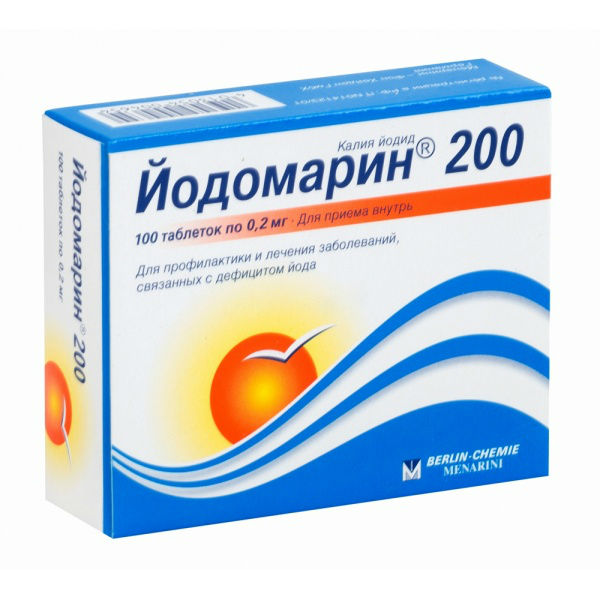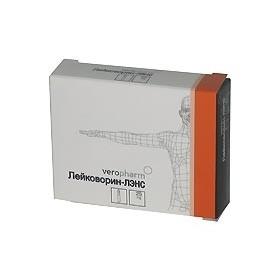Description
Latin name
IODOMARIN ®
Release form
Tablets.
Packing
100 pcs.
Pharmacological action
Pharmacodynamics
Iodine preparation for the treatment and prevention of thyroid diseases.
Iodine is a vital trace mineral necessary for the normal functioning of the thyroid gland. Thyroid hormones perform many vital functions, including regulate the metabolism of proteins, fats, carbohydrates and energy in the body, the activity of the brain, nervous and cardiovascular systems, genital and mammary glands, as well as the growth and development of the child.
The use of the drug Iodomarin ® compensates for the iodine deficiency in the body, preventing the development of iodine deficiency diseases, contributes to the normalization of thyroid function, which is especially important for children and adolescents, as well as during pregnancy and lactation.
Pharmacokinetics
Pharmacokinetics of the drug Iodomarin ® not available.
Indications
Prevention of endemic goiter (especially in children, adolescents, in women during pregnancy and during breastfeeding)
prevention of relapse of goiter after surgical removal or after drug treatment with thyroid hormones
treatment of diffuse euthyroid goiter caused by iodine deficiency in children, adolescents and adults under the age of 40 years.
Contraindications
Hypersensitivity to iodine
hyperthyroidism
toxic thyroid adenoma, nodular goiter when used in doses of more than 300 mcg / day (except for the period of preoperative iodotherapy with the purpose of blocking thyroid function)
herpetiform (senile) Dühring dermatitis.
The drug should not be used for hypothyroidism, except in cases where the development of the latter is caused by severe iodine deficiency.
Avoid prescribing the drug in the treatment of radioactive iodine, the presence or suspected cancer of the thyroid gland.
Use during pregnancy and lactation
During pregnancy and lactation, the need for iodine increases, therefore it is especially important to use the drug Iodomarin ® in sufficient doses (200 Ñg / day) to ensure adequate intake of iodine in the body.
The use of the drug Iodomarin ® during pregnancy and lactation (breastfeeding) is possible only in recommended doses, because the active substance crosses the placenta and is excreted in breast milk.
Composition
1 tablet contains:
Active substances:
potassium iodide 262 mcg, which corresponds to an iodine content of 200 mg.
Excipients:
lactose monohydrate – 150.238 mg,
magnesium carbonate basic – 56.5 mg,
gelatin – 8 mg,
carboxymethyl starch sodium (type A) – 9.5 mg,
silicon dioxide colloidal – 3.5 mg,
magnesium stearate – 2 mg.
Dosage and administration of
Prevention of endemic goiter
Newborns and children under 12 years of age: 1 / 2-1 tab. the drug Iodomarin ® 100 or 1/2 tab. the drug Iodomarin ® 200 per day (which corresponds to 50-100 μg of iodine).
Children over 12 years old and adults: 1-2 tab. the drug Iodomarin ® 100 or 1 / 2-1 tab. the drug Iodomarin ® 200 per day (which corresponds to 100-200 micrograms of iodine).
During pregnancy and lactation: 2 tab. the drug Iodomarin ® 100 or 1 tab. Iodomarin ® 200 per day (which corresponds to 200 mcg of iodine).
Prevention of relapse of goiter
1-2 tab. the drug Iodomarin ® 100 or 1 / 2-1 tab. the drug Iodomarin ® 200 per day (which corresponds to 100-200 micrograms of iodine).
Treatment of euthyroid goiter
Newborns and children aged 1 year to 18 years: 1-2 tab. the drug Iodomarin ® 100 or 1 / 2-1 tab. the drug Iodomarin ® 200 per day (which corresponds to 100-200 micrograms of iodine).
Adults under 40 years of age: 3-5 tab. the drug Iodomarin ® 100 per day or 11 / 2-21 / 2 tab. the drug Iodomarin ® 200 per day (which corresponds to 300-500 μg of iodine).
The drug is taken after a meal with a sufficient amount of liquid. When used in children, it is recommended to pre-dissolve the drug in milk or juice.
Prophylactic administration is carried out for several years, if indicated, for life.
For the treatment of goiter in newborns, on average, 2-4 weeks is enough in children, adolescents and adults, it usually takes 6-12 months, a long administration is possible.
Duration of treatment is determined by the attending physician.
Side effects of
With the prophylactic use of the drug Iodomarin ® in patients of any age, side effects are usually not observed.
From the endocrine system: when using the drug in a dose of more than 150 μg iodine / day, latent hyperthyroidism can become manifest when using the drug in a dose exceeding 300 μg iodine / day, iodine-induced thyrotoxicosis may develop (especially in elderly patients, suffering from goiter for a long time, in the presence of nodular goiter or diffuse toxic goiter).
Allergic reactions: rarely – iodism, manifested by a metallic taste in the mouth, swelling and inflammation of the mucous membranes (iodine rhinitis, conjunctivitis, bronchitis), iodine fever, iodine acne in some cases – Quincke’s edema, exfoliative dermatitis.
Drug Interaction
Iodine deficiency increases and excess iodine decreases the effectiveness of thyroid therapy with hyperthyroidism (it is advisable to avoid any use of iodine before or during treatment). On the other hand, thyrostatic agents inhibit the transition of iodine to organic compound in the thyroid gland and, thus, may cause goiter formation.
Concomitant treatment with high doses of iodine and lithium salts may promote the development of goiter and hypothyroidism.
High doses of the drug in combination with potassium-sparing diuretics can lead to hyperkalemia.
Overdose
Symptoms: mucous membranes brown, reflex vomiting (if food contains starchy vomits become blue in color), abdominal pain and diarrhea (possibly milled). In severe cases, dehydration and shock may develop. In rare cases, esophageal stenosis, a phenomenon of iodism, have been observed.
Treatment: in acute intoxication – cancellation of the drug, gastric lavage with starch, protein or 5% sodium thiosulphate solution before removal of all traces of iodine in chronic intoxication – cancellation of the drug. Symptomatic therapy of disturbance of water balance, electrolyte balance, antishock therapy.
In the treatment of iodine-induced hypothyroidism – withdrawal of the drug, normalization of metabolism with the help of thyroid hormones.
In the treatment of iodine-induced thyrotoxicosis – in mild forms of treatment is not required, in severe forms requires thyroid therapy (the effect of which is always delayed). In the most severe cases (thyrotoxic crisis) intensive care, plasmapheresis or thyroidectomy are required.
Storage conditions
Keep out of the reach of children, in a dry, dark place at a temperature not exceeding 25 ° C.
Expiration
3 years.
Active substance
potassium iodide
Dispensing conditions from
pharmacies No prescription
dosage form
Dosage form
tablets


